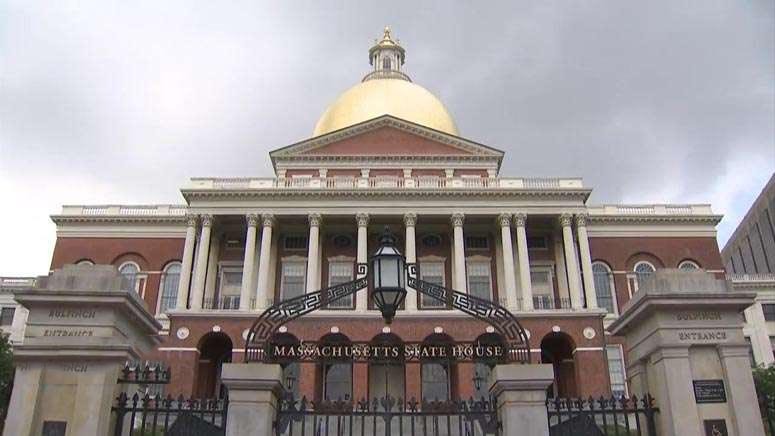BOSTON, JUNE 21, 2022…..The odds of estate tax reform appeared to improve Tuesday, and a potential tax relief package could also feature some ideas that haven’t yet been publicly floated, Senate President Karen Spilka said Tuesday.
With inflation high and the state on track for another major revenue surplus this fiscal year, legislative leaders for weeks have been saying they plan to produce a tax relief package but a plan has not surfaced with less than six weeks remaining to get a bill through the Legislature and to Gov. Charlie Baker.
Spilka, at a Greater Boston Chamber of Commerce breakfast, teased some areas under consideration.
“We are currently in discussions about a tax relief proposal, which may include changes to the Earned Income Tax Credit and the estate tax, among others — some of which you may have heard suggestions, some of which not,” she said. “And we will continue to ensure that Massachusetts is open, competitive and inclusive and that these same values will guide our tax relief proposal.”
Baker filed his own nearly $700 million relief package in January, which featured breaks for seniors, renters, parents, and low-income workers. Baker’s bill, one of dozens still before the Revenue Committee, also proposed lowering the short-term capital gains tax rate and changing the threshold where the state’s estate tax kicks in — currently $1 million.
Estate tax changes appear to be emerging as a broad area of consensus, though the Democrats who control the Legislature may differ in their precise approach from what Baker proposed. The estate tax is a transfer tax on the value of a decedent’s estate before distribution to any beneficiary.
The Massachusetts Taxpayers Foundation has described Massachusetts as an “outlier among the states” on the estate tax, noting that the Bay State and Oregon’s $1 million taxation thresholds are the lowest of the 12 states with estate taxes.
Under Baker’s plan, the threshold at which the estate tax kicks in would double to $2 million. While the current tax applies to the full value of estates over $1 million, Baker’s bill (H 4361) would tax only the amount above $2 million.
Last month, after his own address to the Greater Boston Chamber, House Speaker Ron Mariano said the idea of changing the threshold at which the estate tax kicks in “was something that jumped out at us right away.”
Spilka on Tuesday tied the estate-tax issue to rising home prices and property values in Massachusetts.
The median single-family home sale price in Massachusetts hit $590,000 last month, according to The Warren Group, and it was higher in some parts of the state — $800,000 in Middlesex County, for instance.
“There’s so many seniors who bought their houses ten, 20, 30 years ago, when their house was maybe either $15,000, 20, 25, that is now worth about a million, so having a house at that value does not necessarily indicate wealth, particularly if they are in their elder years,” Spilka told reporters after her speech. “So we are definitely taking a good look at that.”
Baker, in his bill, blended policies that would span across tax brackets, proposing changes that would benefit some of the state’s lowest-income workers and others that would offer relief to wealthier residents. As lawmakers craft their plans, one looming question is which populations they will steer their efforts toward.
“I want to focus on tax relief, not only for something maybe like the estate tax, but especially our low-income residents and families in our time,” Spilka said. “That’s why the Senate a few years back, when I was chair of Ways and Means, we did an increase in the EITC. That’s something that all research shows is one of the best tax relief to give to folks because it not only goes directly into their pockets, but in turn then it is spent on Main Street.”
The fiscal 2019 state budget increased the state Earned Income Tax Credit, available to eligible low- and moderate-income families, to 30 percent of the federal credit level. That boost came after lawmakers and Baker in 2015 expanded the EITC from 15 to 23 percent of the federal credit.
A further expansion of the EITC was among the suggestions members of the Revenue Committee heard in February, when they held a hearing on Baker’s plan.
The Revenue Committee, chaired by Braintree Rep. Mark Cusack and Pittsfield Sen. Adam Hinds, gave itself until Friday, July 1 to report on Baker’s bill.
The Legislature has been reviewing hundreds of tax-related bills since the start of the session in January 2021, and formal lawmaking business ends this year on July 31, setting that as a deadline for passage of major bills.
Asked when a bill might come out of committee, Spilka said, “It’s almost July.”
“I could just say to you ‘In July,’ which is very soon, but we are in discussions not only internally in the Senate but in the House to try to help spur movement along,” she said.
(Copyright (c) 2024 State House News Service.

